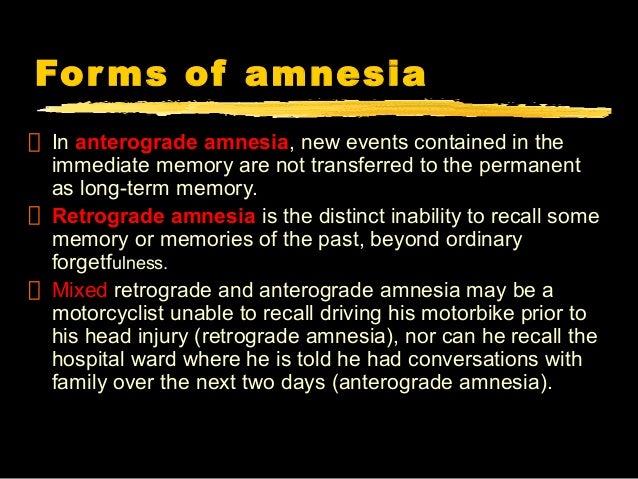
Anterograde Amnesia Definition Psychology. Pathology amnesia caused by brain damage in which the memory loss relates to events occurring after the damage. When people suffer from sudden memory loss the memories that they lose are generally what are known as episodic or explicit. After the onset of the disorder the sufferer will not be able to remember anything that occurs after his attention is shifted away from one subject for more than a few seconds. Anterograde amnesia may involve either partial or total inability to remember events that have happened.

Circumscribed amnesia loss of memory for all events during a discrete specific period of time. Describes the concept of moving forward in space and time. Anterograde amnesia not only affects the memory formation but also impairs some other cognitive functions of the person. After the onset of the disorder the sufferer will not be able to remember anything that occurs after his attention is shifted away from one subject for more than a few seconds. Psychology Definition of ANTEROGRADE AMNESIA. Anterograde amnesia impairment of memory for events occurring after the onset of amnesia.
Where retrograde amnesia is a failure in the brains ability to retrieve information anterograde amnesia is a failure in the ability to store information.
The phenomena of anterograde and retrograde amnesia have been described in the laboratory and clinic for more than 100 years Ribot 1881 and have been an important source of information about the structure and organization of memory. Loss of memory for events that occurred prior to brain trauma. Short Description or Definition Anterograde amnesia is an inability to recall or recognize events facts or concepts to which one was exposed following the onset of illness. Anterograde amnesia may involve either partial or total inability to remember events that have happened. Unlike retrograde amnesia it is the inability to form new memories. Anterograde amnesia refers to a decreased ability to retain new information.